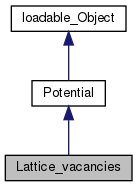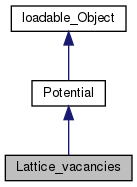Introduce lattice vacancies at random positions. More...
#include <externalpotential.hpp>


Additional Inherited Members | |
 Public Types inherited from Potential Public Types inherited from Potential | |
| typedef STD_TR1::shared_ptr< Potential > | ref |
 Public Types inherited from loadable_Object Public Types inherited from loadable_Object | |
| typedef STD_TR1::shared_ptr< loadable_Object > | ref |
| typedef STD_TR1::shared_ptr< const loadable_Object > | const_ref |
| typedef std::pair< std::string, ref > | ref_pair |
| typedef STD_TR1::weak_ptr< loadable_Object > | link |
| typedef STD_TR1::weak_ptr< const loadable_Object > | const_link |
 Public Member Functions inherited from Potential Public Member Functions inherited from Potential | |
| void | prepare_pot (const geometry_const_Iterator &p) |
| Perform time-consuming calculations once for each slice. | |
| complex | get_pot (int iy) |
| Return value of the potential at index iy on current slice. | |
 Public Member Functions inherited from loadable_Object Public Member Functions inherited from loadable_Object | |
| void | write_xml (std::ostream &) const |
| Output the xml code that would construct the object to stream. | |
| loadable_Object () | |
| Empty construction, objects are initialized by init routine. | |
| const char * | class_Name () const |
| Calls virtual const char* name(), which must be redefined for derived classes. | |
| bool | get_param (const std::string &s, double &v) const |
| get a double, integer or string parameter by name (s), return wether parameter exists | |
| bool | get_param (const std::string &s, int &v) const |
| bool | get_param (const std::string &s, std::string &v) const |
| double | get_double_param (const std::string &s) const |
| get a double, integer or string parameter, throw if it does not exist | |
| int | get_int_param (const std::string &s) const |
| std::string | get_string_param (const std::string &s) const |
| void | set_param (const std::string &s, double v) |
| set a double, integer or string parameter | |
| void | set_param (const std::string &s, int v) |
| void | set_param (const std::string &s, std::string v) |
| bool | get_bool (const std::string &s, const bool def) const |
| return bool parameter, return def if string not found | |
| void | acquire_params (const const_ref &) |
| import all parameters from another object | |
| void | insert_object (const std::string &s, ref o) |
| insert an object as parameter | |
| void | link_object (const std::string &s, ref o) |
| insert a link to an object as parameter, the refered object must be defined elsewhere | |
| bool | get_component (const std::string &s, const_ref &) const |
| get a contained object by string s, return wether it exists | |
| bool | get_component (const std::string &s, ref &) |
| const_ref | get_component (const std::string &s) const |
| get a contained object by string s, throw if it does not exist | |
| ref | get_component (const std::string &s) |
| template<typename T > | |
| STD_TR1::shared_ptr< T > | get_dynamic_component (const std::string &s) |
| get a contained object with a dynamic cast More... | |
| template<typename T > | |
| STD_TR1::shared_ptr< const T > | get_dynamic_component (const std::string &s) const |
| ref | get_ref () |
| Get a shared_ptr to this object. More... | |
| const_ref | get_ref () const |
| template<typename T > | |
| STD_TR1::shared_ptr< T > | get_dynamic_ref () |
| Get a dynamic reference to this object. More... | |
| template<typename T > | |
| STD_TR1::shared_ptr< const T > | get_dynamic_ref () const |
| void | initialize (ref me) |
| called by the xml_parser to initialize the object More... | |
| void | set_correct_ref (ref me) |
| called to set reference to object More... | |
| bool | is_initialized () const |
| returns whether the object has been correctly initialized | |
| void | require_initialized () const |
| throws if is_initialized returns false | |
| void | force_reinit () |
| call if parameters are changed, object is completely reinitialized, children are not | |
| void | register_Observer (Observer::ref) |
| register/unregister Observer: All registered Observers will have notify() called upon state change (reinit) | |
| void | unregister_Observer (Observer::ref) |
| size_t | nparams () const |
| returns total number of parameters | |
| ref | clone () const |
| returns a complete clone of the Object and all parameters (with correct dynamic type) | |
| virtual size_t | verbosity () |
 Static Public Member Functions inherited from loadable_Object Static Public Member Functions inherited from loadable_Object | |
| template<class T > | |
| static STD_TR1::shared_ptr< const T > | clone (const STD_TR1::shared_ptr< const T > r) |
| template<class T > | |
| static STD_TR1::shared_ptr< T > | clone (STD_TR1::shared_ptr< T > r) |
Detailed Description
Introduce lattice vacancies at random positions.
Will increase site energy by E1 (or, randomly selected, E2) introducing lattice defects.
Name: Lattice_vacancies
Parameters: double: [E1], [E2] the introduced site energies. (default E1 = 100, E2 = -E1
[defect_probability] the probability, that a given slice will contain one defect
integers: nx_range, ny_range the maximum region containing defects xmin, xmax, ymin, ymax define a rectangular area on the flake wherein the vacancies are positioned, this does not change the defect probability for a single stripe.
[defect_count] You may specify a defect_count instead of a probability: gives the number of defects to be introduced in nx_range x ny_range
[relposition] You may specify the position of the defect in the unit cell. the ny coordinate of the defect will be chosen such that ny mod 4 = relposition
do_symmetric if ==1, then each E1 defects will have a E2 one adjacent to it
The documentation for this class was generated from the following files:
- src/geometries/inc/externalpotential.hpp
- src/geometries/src/externalpotential.cpp
 1.8.13
1.8.13